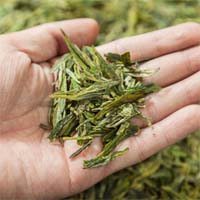Green Tea Component Fights Mesothelioma

Another study appears to confirm the idea that a compound found in green tea may be a powerful tool for combatting malignant pleural mesothelioma.
Epigallocatechin-3-gallate (EGCG) is a potent antioxidant found in abundance in green (though, not black) tea. It has long been thought to help fight cancer and other diseases by reducing the so-called free radicals produced during oxidative stress. Now, a new study conducted in Japan and published in Cancer Cell International finds that EGCG triggered cell death in five different human mesothelioma cell lines by doing just the opposite.
“We found that EGCG induced apoptosis (cell death) in all five mesothelioma cell lines in a dose-dependent manner,” write the authors in a summary of their findings. “We further clarified the cell killing mechanism; EGCG induced reactive oxygen species (ROS), and impaired the mitochondrial membrane potential.”
The production of reactive oxygen species (ROS) is an example of oxidative stress. While EGCG may help protect cells against ROS in lower concentrations, the new study finds that high doses of EGCG increased the ROS inside mesothelioma cancer cells, killing them. When the team treated the cells with compounds that fight ROS (catalase and tempol), EGCG was not as effective at inducing apoptosis. As the authors observe, “In most mesothelioma cell lines, higher concentrations (i.e. 100 µM or 200 µM) of EGCG induced cell death and low concentrations (i.e. 10 µM ) of EGCG failed to induce cell death.”
The other notable effect EGCG had on mesothelioma cells was autophagy. Autophagy is a breakdown of certain cellular components in reaction to stress. While it can be damaging, it can also be a way for cells to protect themselves from attack by outside agents. In the case of the mesothelioma cell lines being tested, although the autophagy triggered by EGCG may have done some damage, the damage was even worse when autophagy was suppressed.
The findings seem to support previous research, published last year in the Journal of Cellular and Molecular Medicine, that “EGCG is selectively cytotoxic to malignant mesothelioma cells with respect to normal mesothelial cells”. The Japanese team next plans to confirm their findings with tests of EGCG in live animals with mesothelioma. This study did not address the question whether drinking more green tea has any therapeutic value for mesothelioma patients. Ask your doctor.
Sources:
Ranzato, E, et al, “Epigallocatechin-3-gallate induces mesothelioma cell death via H2 O2 -dependent T-type Ca2+ channel opening”, November 16, 22012, Journal of Cellular and Molecular Medicine, pp. 2667-78.





